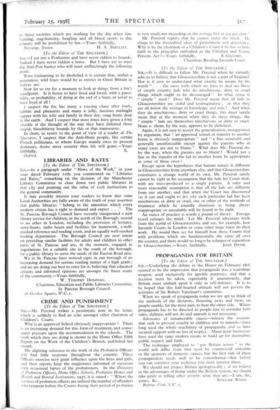PROPAGANDA FOR BRITAIN
[To the Editor of THE SPECTATOR.] SIR,—Underlying the debate in the House on February 15th seemed to be the impression that propaganda was a scurrilous weapon, used exclusively for ignoble purposes, and that a decision must be taken, regrettably if unanimously, that Britain must embark upon it only in self-defence. It is to be hoped that this half-hearted attitude will not govern the activities of Sir Robert Vansittart's committee.
When we speak of propaganda today we are apt to think of the methods of the dictators, thrusting news and views on people unable, for the most part, to hear the other side. Where propaganda has to be directed to people free to consider both sides, dullness will not do and untruth is not necessary.
Advocates of innumerable causes—witness the societies that seek to prevent cruelty to children and to animals—have long used the whole machinery of propaganda, and so have secured support with no loss of respect. Many great businesses have used the same modern means to build up for themselves public respect and faith.
The technique employed to " put Britain across " to the world will differ from that used by commercial concerns or the sponsors of domestic causes, but the first rule of these propagandists needs well to be remembered—that before you can convince your audience you must interest them.
We should not project Britain apologetically ; if we believe in the advantages of living under the British system, we should take pride in telling other peoples what they are.—I am, Sir,
















































 Previous page
Previous page